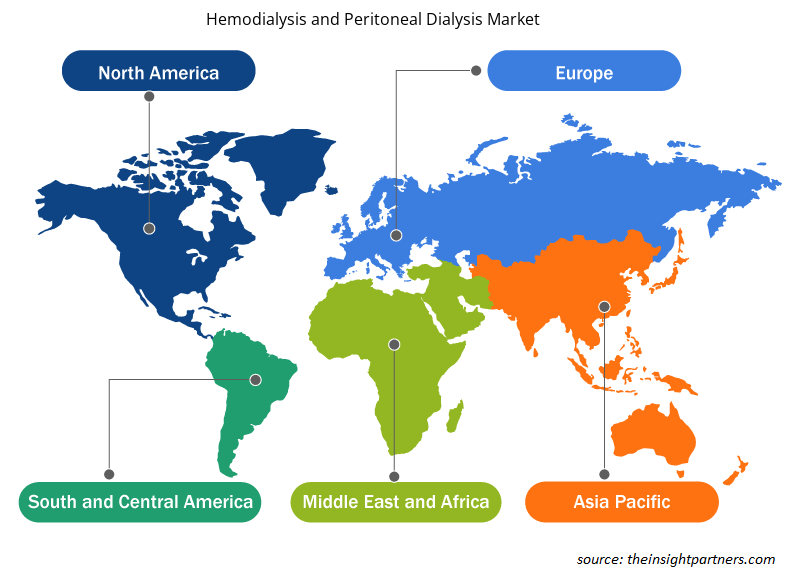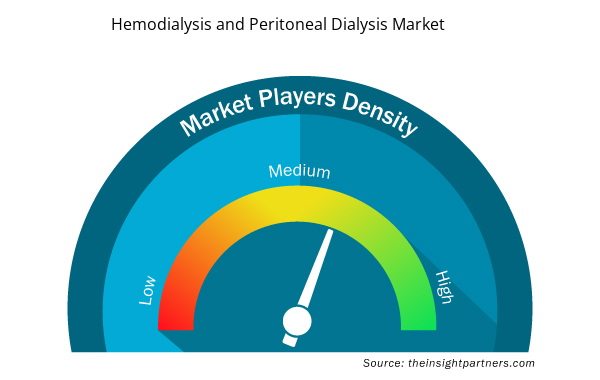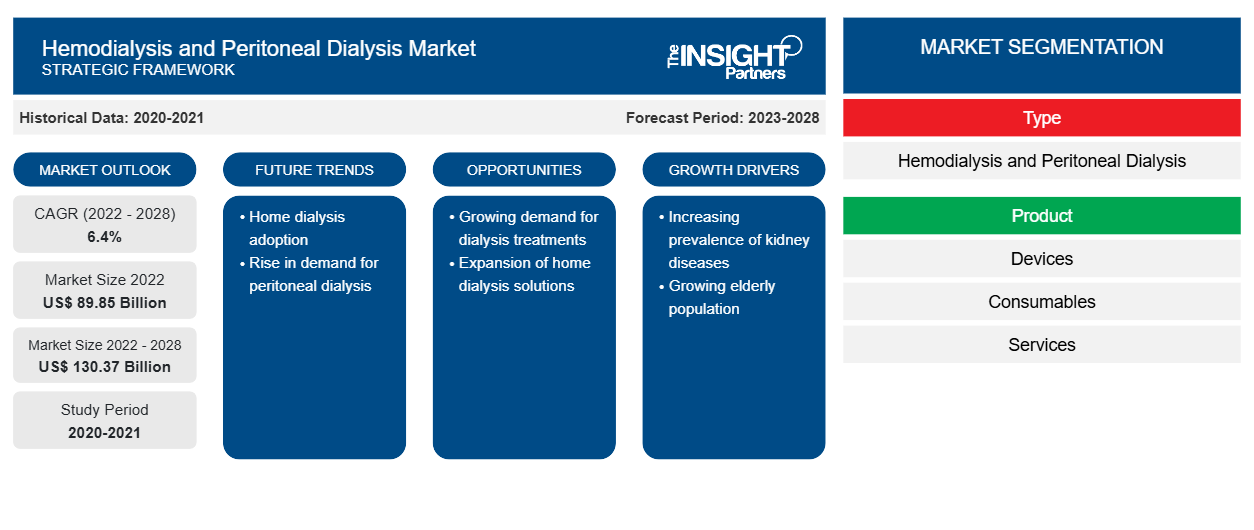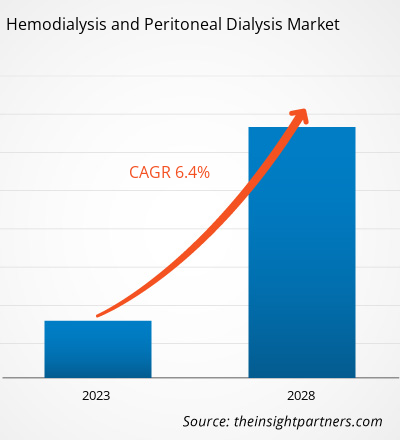Der Markt für Hämodialyse und Peritonealdialyse soll von 89.851,61 Millionen US-Dollar im Jahr 2022 auf 130.370,18 Millionen US-Dollar im Jahr 2028 anwachsen; von 2022 bis 2028 wird mit einer durchschnittlichen jährlichen Wachstumsrate von 6,4 % gerechnet.
Es gibt zwei Arten der Dialyse. Bei der Hämodialyse wird das Blut aus dem Körper des Patienten in eine künstliche Niere gepumpt und über an die Maschine angeschlossene Schläuche wieder in den Körper des Patienten zurückgeführt. Bei der Peritonealdialyse fungiert die Bauchdecke des Patienten als natürlicher Filter.
Der Markt für Hämodialyse und Peritonealdialyse ist nach Typ, Produkt, Endverbraucher und Geografie segmentiert. Geografisch ist der Markt grob in Nordamerika, Europa, Asien-Pazifik, den Nahen Osten und Afrika sowie Süd- und Mittelamerika unterteilt. Der Marktbericht für Hämodialyse und Peritonealdialyse bietet Einblicke und eine eingehende Analyse des Marktes und betont Parameter wie Marktgröße, Trends, technologische Fortschritte und Marktdynamik sowie die Analyse der Wettbewerbslandschaft der weltweit führenden Marktteilnehmer. Darüber hinaus enthält der Bericht die Auswirkungen der COVID-19-Pandemie auf den Hämodialyse- und Peritonealdialysemarkt in allen Regionen.
Das Wachstum des Hämodialyse- und Peritonealdialysemarktes ist auf die steigende Zahl von Patienten mit terminaler Niereninsuffizienz, die Zunahme von Nierenversagen und chronischer Nierenfunktionsstörung in der Bevölkerung sowie den Mangel an Organspendern zurückzuführen. Die Bedenken hinsichtlich der Kostenerstattung in den Schwellenmärkten schränken das Marktwachstum jedoch ein.
Passen Sie diesen Bericht Ihren Anforderungen an
Sie erhalten kostenlos individuelle Anpassungen an jedem Bericht, einschließlich Teilen dieses Berichts oder einer Analyse auf Länderebene, eines Excel-Datenpakets sowie tolle Angebote und Rabatte für Start-ups und Universitäten.
- Holen Sie sich die wichtigsten Markttrends aus diesem Bericht.Dieses KOSTENLOSE Beispiel umfasst eine Datenanalyse von Markttrends bis hin zu Schätzungen und Prognosen.
Markteinblicke
Die zunehmende Prävalenz von Nierenerkrankungen treibt das Wachstum des Hämodialyse- und Peritonealdialysemarktes voran
Chronische Nierenerkrankung (CKD) und akutes Nierenversagen (AKI) sind Erkrankungen, bei denen die Nieren geschädigt sind und das Blut nicht mehr richtig filtern können. Aus diesem Grund verbleiben überschüssige Flüssigkeit und Abfallprodukte aus dem Blut im Körper, was zu anderen Gesundheitsproblemen wie Herzerkrankungen und Schlaganfällen führen kann. CKD verschlimmert sich normalerweise mit der Zeit, auch wenn die Behandlung eine langsame Progression gezeigt hat. Wenn CKD unbehandelt bleibt, kann es zu Nierenversagen und frühen Herz-Kreislauf-Erkrankungen kommen. Bei CKD, wenn die Nieren aufhören zu arbeiten, ist eine Dialyse oder Nierentransplantation zum Überleben erforderlich. Bei einer Behandlung mit Dialyse oder Nierentransplantation wird dieses Nierenversagen als Nierenversagen im Endstadium (ESRD) bezeichnet. Laut den Centers for Disease Control and Prevention (CDC) leiden in den USA etwa 36 Millionen Erwachsene an CKD. Darüber hinaus beginnen alle 24 Stunden 360 Menschen mit einer Dialysebehandlung wegen Nierenversagen. Im Jahr 2017 wurden weltweit 697,5 Millionen Fälle von CKD (alle Stadien) registriert, was einer globalen Prävalenz von 9,1 % entspricht. Die zunehmende Verbreitung von Nierenversagen im Endstadium ist ebenfalls einer der Hauptfaktoren, die den Markt antreiben. Laut dem United States Renal Data System (USRDS) leben beispielsweise fast 786.000 Menschen im Land mit Nierenversagen im Endstadium (ESKD), auch als Nierenversagen im Endstadium (ESRD) bekannt. Die zunehmende Verbreitung von chronischen Nierenerkrankungen, akutem Nierenversagen und Nierenversagen im Endstadium, das zu einer Dialyse führt, treibt den Hämodialyse- und Peritonealdialysemarkt an.
Typbasierte Erkenntnisse
Der Markt für Hämodialyse und Peritonealdialyse ist nach Typ in Hämodialyse und Peritonealdialyse unterteilt. Im Jahr 2022 hielt das Hämodialysesegment einen größeren Marktanteil. Darüber hinaus wird für dasselbe Segment im Prognosezeitraum eine höhere durchschnittliche jährliche Wachstumsrate (CAGR) von 6,7 % erwartet.
Produktbasierte Einblicke
Basierend auf dem Produkt ist der Markt für Hämodialyse und Peritonealdialyse in Geräte, Verbrauchsmaterialien und Dienstleistungen unterteilt. Das Dienstleistungssegment hatte im Jahr 2022 den größten Marktanteil. Es wird jedoch erwartet, dass das Verbrauchsmaterialsegment im Prognosezeitraum die höchste durchschnittliche jährliche Wachstumsrate von 7,5 % verzeichnet.
Endbenutzerbasierte Erkenntnisse
Basierend auf dem Endverbraucher ist der Markt für Hämodialyse und Peritonealdialyse in Krankenhaus- und Heimdialyse unterteilt. Das Krankenhaussegment hatte im Jahr 2022 einen größeren Anteil. Es wird jedoch erwartet, dass das Heimsegment im Prognosezeitraum eine höhere durchschnittliche jährliche Wachstumsrate von 7,4 % verzeichnet.
Die Akteure auf dem Hämodialyse- und Peritonealdialysemarkt verfolgen organische Strategien wie Produkteinführung und -erweiterung, um ihre Präsenz und ihr Produktportfolio weltweit zu erweitern und die wachsende Nachfrage zu erfüllen.
Regionale Einblicke in den Hämodialyse- und Peritonealdialysemarkt
Die regionalen Trends und Faktoren, die den Hämodialyse- und Peritonealdialysemarkt während des Prognosezeitraums beeinflussen, wurden von den Analysten von Insight Partners ausführlich erläutert. In diesem Abschnitt werden auch Hämodialyse- und Peritonealdialysemarktsegmente und die Geografie in Nordamerika, Europa, im asiatisch-pazifischen Raum, im Nahen Osten und Afrika sowie in Süd- und Mittelamerika erörtert.

- Erhalten Sie regionalspezifische Daten zum Hämodialyse- und Peritonealdialysemarkt
Umfang des Marktberichts zur Hämodialyse und Peritonealdialyse
| Berichtsattribut | Details |
|---|---|
| Marktgröße im Jahr 2022 | 89,85 Milliarden US-Dollar |
| Marktgröße bis 2028 | 130,37 Milliarden US-Dollar |
| Globale CAGR (2022 - 2028) | 6,4 % |
| Historische Daten | 2020-2021 |
| Prognosezeitraum | 2023–2028 |
| Abgedeckte Segmente | Nach Typ
|
| Abgedeckte Regionen und Länder | Nordamerika
|
| Marktführer und wichtige Unternehmensprofile |
|
Dichte der Marktteilnehmer für Hämodialyse und Peritonealdialyse: Auswirkungen auf die Geschäftsdynamik verstehen
Der Markt für Hämodialyse und Peritonealdialyse wächst rasant. Dies wird durch die steigende Nachfrage der Endnutzer aufgrund von Faktoren wie sich entwickelnden Verbraucherpräferenzen, technologischen Fortschritten und einem größeren Bewusstsein für die Vorteile des Produkts vorangetrieben. Mit der steigenden Nachfrage erweitern Unternehmen ihr Angebot, entwickeln Innovationen, um die Bedürfnisse der Verbraucher zu erfüllen, und nutzen neue Trends, was das Marktwachstum weiter ankurbelt.
Die Marktteilnehmerdichte bezieht sich auf die Verteilung der Firmen oder Unternehmen, die in einem bestimmten Markt oder einer bestimmten Branche tätig sind. Sie gibt an, wie viele Wettbewerber (Marktteilnehmer) in einem bestimmten Marktraum im Verhältnis zu seiner Größe oder seinem gesamten Marktwert präsent sind.
Die wichtigsten auf dem Hämodialyse- und Peritonealdialysemarkt tätigen Unternehmen sind:
- Fresenius Medical Care AG & Co KGaA
- DaVita Inc.
- Baxter International Inc.
- B. Braun Melsungen AG
- Diaverum
Haftungsausschluss : Die oben aufgeführten Unternehmen sind nicht in einer bestimmten Reihenfolge aufgeführt.

- Überblick über die wichtigsten Akteure auf dem Hämodialyse- und Peritonealdialysemarkt
Nach Geografie
Geografisch ist der Hämodialyse- und Peritonealdialysemarkt segmentiert in Nordamerika (USA, Kanada und Mexiko), Europa (Großbritannien, Deutschland, Frankreich, Italien, Spanien und übriges Europa), Asien-Pazifik (China, Japan, Indien, Australien, Südkorea und übriger Asien-Pazifikraum), Naher Osten und Afrika (VAE, Saudi-Arabien, Südafrika und übriger Naher Osten und Afrika) sowie Süd- und Mittelamerika (Brasilien, Argentinien und übriges Süd- und Mittelamerika). Einige der führenden Akteure auf dem Markt sind Fresenius Medical Care AG & Co KGaA; DaVita Inc.; Baxter International Inc.; B. Braun Melsungen AG; Diaverum; Nipro Medical Corporation; Asahi Kasei Medical Co., Ltd.; Rockwell Medical, Inc.; und Dialife SA.
- Historische Analyse (2 Jahre), Basisjahr, Prognose (7 Jahre) mit CAGR
- PEST- und SWOT-Analyse
- Marktgröße Wert/Volumen – Global, Regional, Land
- Branche und Wettbewerbsumfeld
- Excel-Datensatz



Report Coverage
Revenue forecast, Company Analysis, Industry landscape, Growth factors, and Trends

Segment Covered
This text is related
to segments covered.

Regional Scope
North America, Europe, Asia Pacific, Middle East & Africa, South & Central America

Country Scope
This text is related
to country scope.
Häufig gestellte Fragen
Global hemodialysis and peritoneal dialysis market is segmented by region into North America, Europe, Asia Pacific, Middle East & Africa and South & Central America. In North America, the U.S. is the largest market for transport media. The US is estimated to hold the largest share in the hemodialysis and peritoneal dialysis market during the forecast period. The rising prevalence of chronic kidney disease and healthcare spending by Medicare contributes to the market's growth. However, the prevalence of chronic kidney disease (CKD) that demands promising diagnostic test options in the Asia-Pacific is expected to account for the fastest growth of the region during the coming years
The hemodialysis and peritoneal dialysis market majorly consists of the players such as Fresenius Medical Care AG & Co KGaA; DaVita Inc.; Baxter International Inc.; B. Braun Melsungen AG; Diaverum; Nipro Medical Corporation; Evoqua Water Technologies LLC. (Mar Cor Purification); Asahi Kasei Medical Co., Ltd.; Rockwell Medical, Inc.; Dialife SA; amongst others.
The hospital-based segment dominated the global hemodialysis and peritoneal dialysis market and held the largest revenue share of 84.16% in 2022.
The hemodialysis segment dominated the global hemodialysis and peritoneal dialysis market and held the largest revenue share of 86.09% in 2022.
The services segment dominated the global hemodialysis and peritoneal dialysis market and held the largest revenue share of 60.98% in 2022.
Hemodialysis and peritoneal dialysis are performed for patients suffering from chronic kidney disease and acute kidney injury. Hemodialysis helps in removing waste from body such as urea from the blood, along with maintaining proper balance of electrolytes in the blood. Peritoneal dialysis procedures are conducted in lining of the abdomen to filter the blood in people who suffer from kidney failures.
Key factors that are driving the growth of this market are increasing prevalence of kidney diseases, and increasing prevalence of diabetes.
Trends and growth analysis reports related to Life Sciences : READ MORE..
The List of Companies - Hemodialysis And Peritoneal Dialysis Market
- Fresenius Medical Care AG & Co KGaA
- DaVita Inc.
- Baxter International Inc.
- B. Braun Melsungen AG
- Diaverum
- Nipro Medical Corporation
- Evoqua Water Technologies LLC. (Mar Cor Purification)
- Asahi Kasei Medical Co., Ltd.
- Rockwell Medical, Inc.
- Dialife SA
The Insight Partners performs research in 4 major stages: Data Collection & Secondary Research, Primary Research, Data Analysis and Data Triangulation & Final Review.
- Data Collection and Secondary Research:
As a market research and consulting firm operating from a decade, we have published and advised several client across the globe. First step for any study will start with an assessment of currently available data and insights from existing reports. Further, historical and current market information is collected from Investor Presentations, Annual Reports, SEC Filings, etc., and other information related to company’s performance and market positioning are gathered from Paid Databases (Factiva, Hoovers, and Reuters) and various other publications available in public domain.
Several associations trade associates, technical forums, institutes, societies and organization are accessed to gain technical as well as market related insights through their publications such as research papers, blogs and press releases related to the studies are referred to get cues about the market. Further, white papers, journals, magazines, and other news articles published in last 3 years are scrutinized and analyzed to understand the current market trends.
- Primary Research:
The primarily interview analysis comprise of data obtained from industry participants interview and answers to survey questions gathered by in-house primary team.
For primary research, interviews are conducted with industry experts/CEOs/Marketing Managers/VPs/Subject Matter Experts from both demand and supply side to get a 360-degree view of the market. The primary team conducts several interviews based on the complexity of the markets to understand the various market trends and dynamics which makes research more credible and precise.
A typical research interview fulfils the following functions:
- Provides first-hand information on the market size, market trends, growth trends, competitive landscape, and outlook
- Validates and strengthens in-house secondary research findings
- Develops the analysis team’s expertise and market understanding
Primary research involves email interactions and telephone interviews for each market, category, segment, and sub-segment across geographies. The participants who typically take part in such a process include, but are not limited to:
- Industry participants: VPs, business development managers, market intelligence managers and national sales managers
- Outside experts: Valuation experts, research analysts and key opinion leaders specializing in the electronics and semiconductor industry.
Below is the breakup of our primary respondents by company, designation, and region:

Once we receive the confirmation from primary research sources or primary respondents, we finalize the base year market estimation and forecast the data as per the macroeconomic and microeconomic factors assessed during data collection.
- Data Analysis:
Once data is validated through both secondary as well as primary respondents, we finalize the market estimations by hypothesis formulation and factor analysis at regional and country level.
- Macro-Economic Factor Analysis:
We analyse macroeconomic indicators such the gross domestic product (GDP), increase in the demand for goods and services across industries, technological advancement, regional economic growth, governmental policies, the influence of COVID-19, PEST analysis, and other aspects. This analysis aids in setting benchmarks for various nations/regions and approximating market splits. Additionally, the general trend of the aforementioned components aid in determining the market's development possibilities.
- Country Level Data:
Various factors that are especially aligned to the country are taken into account to determine the market size for a certain area and country, including the presence of vendors, such as headquarters and offices, the country's GDP, demand patterns, and industry growth. To comprehend the market dynamics for the nation, a number of growth variables, inhibitors, application areas, and current market trends are researched. The aforementioned elements aid in determining the country's overall market's growth potential.
- Company Profile:
The “Table of Contents” is formulated by listing and analyzing more than 25 - 30 companies operating in the market ecosystem across geographies. However, we profile only 10 companies as a standard practice in our syndicate reports. These 10 companies comprise leading, emerging, and regional players. Nonetheless, our analysis is not restricted to the 10 listed companies, we also analyze other companies present in the market to develop a holistic view and understand the prevailing trends. The “Company Profiles” section in the report covers key facts, business description, products & services, financial information, SWOT analysis, and key developments. The financial information presented is extracted from the annual reports and official documents of the publicly listed companies. Upon collecting the information for the sections of respective companies, we verify them via various primary sources and then compile the data in respective company profiles. The company level information helps us in deriving the base number as well as in forecasting the market size.
- Developing Base Number:
Aggregation of sales statistics (2020-2022) and macro-economic factor, and other secondary and primary research insights are utilized to arrive at base number and related market shares for 2022. The data gaps are identified in this step and relevant market data is analyzed, collected from paid primary interviews or databases. On finalizing the base year market size, forecasts are developed on the basis of macro-economic, industry and market growth factors and company level analysis.
- Data Triangulation and Final Review:
The market findings and base year market size calculations are validated from supply as well as demand side. Demand side validations are based on macro-economic factor analysis and benchmarks for respective regions and countries. In case of supply side validations, revenues of major companies are estimated (in case not available) based on industry benchmark, approximate number of employees, product portfolio, and primary interviews revenues are gathered. Further revenue from target product/service segment is assessed to avoid overshooting of market statistics. In case of heavy deviations between supply and demand side values, all thes steps are repeated to achieve synchronization.
We follow an iterative model, wherein we share our research findings with Subject Matter Experts (SME’s) and Key Opinion Leaders (KOLs) until consensus view of the market is not formulated – this model negates any drastic deviation in the opinions of experts. Only validated and universally acceptable research findings are quoted in our reports.
We have important check points that we use to validate our research findings – which we call – data triangulation, where we validate the information, we generate from secondary sources with primary interviews and then we re-validate with our internal data bases and Subject matter experts. This comprehensive model enables us to deliver high quality, reliable data in shortest possible time.


 Holen Sie sich ein kostenloses Muster für diesen Bericht
Holen Sie sich ein kostenloses Muster für diesen Bericht